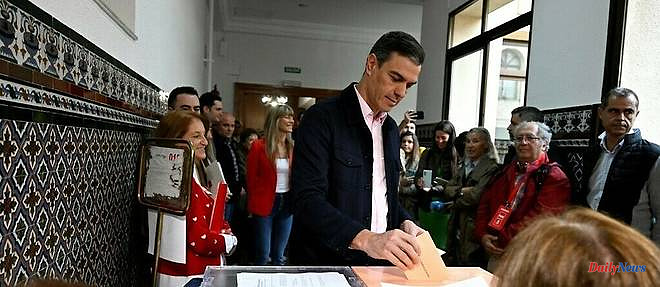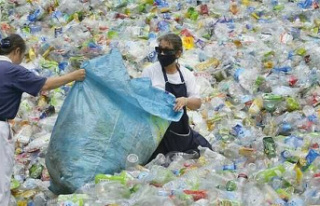Six months before the legislative elections, the Socialist Party (PSOE) of Prime Minister Pedro Sanchez suffered a very clear setback in the municipal and regional elections on Sunday May 28 in Spain, according to the first official results and media projections. "We are facing a tide of the right in Spain," the outgoing head of government of Cantabria (northern Spain), Miguel Angel Revilla, told reporters.
The People's Party (PP, right) led by Alberto Nuñez Feijoo, which had made these local and regional elections a national referendum on the policy of Pedro Sanchez, has achieved its first objective, which was to be the party with the greatest number of votes in municipal elections. After counting more than 97% of the votes for the municipal elections, the PP won nearly 6.9 million votes (31.47%) against just over 6.1 million for the PSOE of Pedro Sanchez (28.18%) .
Above all, the PP was almost certain to conquer several regions hitherto led by the PSOE, first and foremost the Valencian Community (east), the fourth in the country by population, according to Spanish public television (TVE). In addition, the socialist party was about to lose the town hall of Seville, the largest city in Andalusia (south) and one of its strongholds, to the benefit of the PP, still according to TVE.
Spain "has started a new political cycle", Alberto Nuñez Feijoo, leader of the main right-wing opposition party, said Sunday evening after his victory in the municipal and regional elections. "My time will come if the Spaniards want it," the political leader continued in response to cries of "Presidente!" President! (President of the Government) from the crowd in Madrid, who already see him as the next Prime Minister. "We won cleanly, democratically," Alberto Nuñez Feijoo said again.
At the same time, the PSOE failed in its attempt to recover the town hall of Barcelona, the great metropolis of Catalonia, which it occupied from 1979 to 2011. The elections this Sunday concerned all 8,131 municipalities, i.e. 35.5 million voters, as well as the assemblies of 12 of the 17 autonomous regions. Some 18.3 million voters were affected by this second vote.
This double ballot was considered a general rehearsal before the legislative elections, the exact date of which is not yet known. Pedro Sanchez's name did not appear on any ballot on Sunday, nor did Alberto Nuñez Feijoo's.
But what was at stake was very important for the two men, who had been heavily involved in the campaign, to the point of giving these elections a national look and a first round before the legislative elections at the end of the year. The Popular Party took "a giant step" on Sunday on the road to lead its leader in December to the post of Prime Minister, launched the president of the government of Andalusia, Juan Manuel Moreno Bonilla, member of the PP.
Prime Minister since 2018, Pedro Sanchez faced many handicaps: the wear and tear of power, the resumption of inflation - even if it is much lower in Spain than in most other countries of the European Union - and the resulting sharp drop in purchasing power. He also had to face the repeated crises shaking the government coalition formed by the socialists and the radical left party Podemos. According to the first results from different regions, Podemos also seems to be in very sharp decline.
Pedro Sanchez had campaigned on the record of his government, mainly in the economic field. He was all the more under pressure as his party had a lot to lose, since of the 12 regions that renewed their assembly on Sunday, the Socialists led 10 (including a region led by a regionalist party with which they are allied). For its part, the PP controlled the other two regions, including that of Madrid, and was assured of retaining them. In the capital, the very right-wing president of the region, Isabel Diaz Ayuso (PP), even seemed able to win an absolute majority of the seats.
If the Prime Minister's priority was simply to resist, Alberto Nuñez Feijoo's was twofold: to win the greatest number of votes at the national level in the municipal elections and to wrest as many regions as possible from the Socialists, in order to prove, as he asserts, that the country no longer wants Pedro Sanchez and that his victory in the legislative elections is inevitable. Alberto Nuñez Feijoo was playing big, as he was leading the PP to elections for the first time since taking over as party leader just over a year ago.












